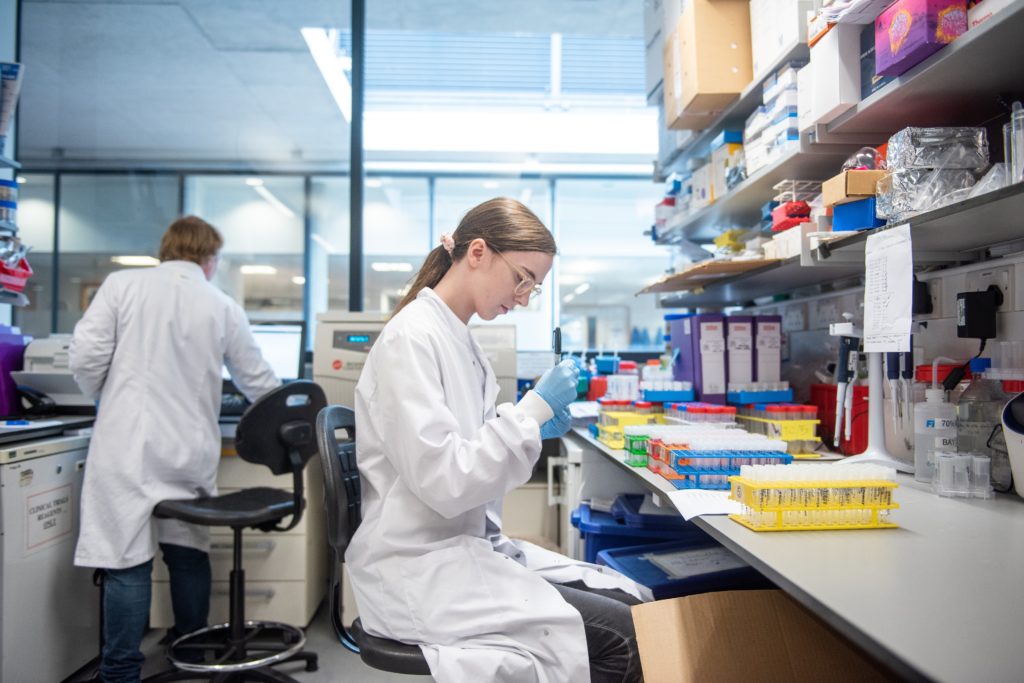Oxford Biomedical Research Centre (BRC) researchers have highlighted how the BRC’s infrastructure gave it the agility and capacity to respond rapidly with research projects to tackle COVID-19.

In a commentary published in the open access BMC Health Research Policy and Systems journal, the BRC team said the development of the Oxford AstraZeneca (AZ) vaccine and the RECOVERY Trial, the world’s largest trial of potential treatments for COVID-19, were examples that “illustrate capability and capacity at an organizational and individual level in a dynamic environment to respond during the COVID-19 public health challenge”.
It went on: “This response was underpinned by swift adaptation and repurposing of existing research resources and expertise by the Oxford BRC to deliver rapid research to address different aspects of COVID-19. Rapid response research in turbulent environments requires strategic organizational leadership to create resilient infrastructure and resources.”
At the beginning of the pandemic, Oxford BRC research funding was quickly reallocated to ‘pump-prime’ emerging high-impact COVID-19-related research, including the Oxford/AZ vaccine and the RECOVERY trial. One year later, it had supported more than 100 COVID-19 projects, 34 of which were Urgent Public Health (UPH) research studies nationally prioritised by the NIHR.
Oxford BRC Director Prof Helen McShane said: “We’re proud that – thanks to our structure, governance and collaborative leadership – we were agile enough to reallocate funding quickly and facilitate the adaptation and repurposing of existing resources and expertise to deliver rapid research that addressed the most pressing issues relating to the pandemic., not least the development of a vaccine and identifying effective treatments.”
She added: “As a partnership between a leading NHS Foundation Trust and the world’s highest-ranked institution for medical teaching and research, the Oxford BRC was particularly well placed to deliver rapid COVID-19 research. Not only are many of its researchers also practising clinicians providing direct care to patients, alongside their academic work. Its research is fully integrated with Oxford’s hospitals, ensuring medical innovations can implemented quickly in the clinical setting.”
The Oxford BRC provided crucial early funding to accelerate the development of the COVID-19 vaccine, work led by researchers in its Vaccines Theme, and then contributed to a clinical trial to evaluate the safety of the vaccine.
The BRC was also one of the institutions that contributed to the Randomised Evaluation of COVID-19 Therapy (RECOVERY) trial, which has identified three effective treatments for those hospitalised with COVID-19, as well as ruling out a number of other potential treatments. This UPH trial, co-led by Professor Martin Landray, BRC Theme Lead for the Clinical Informatics and Big Data, was rolled out at record speed, with the first patient being enrolled just nine days after the protocol was first drafted.
The paper points out that the creation of the NIHR BRCs by Professor Dame Sally Davies’ in 2006 created strong research infrastructure and significant funding, which positioned the UK as a world leader in clinical research.
It highlights the foresight in creating this translational research funding and infrastructure, which led to significant expansion in the capacity and capability of translational research and the establishment of BRCs, but also its integration with the NHS, which helped to “facilitate agile response to crises”.
Oxford BRC Senior Manager Dr Lorna Henderson, lead author of the paper, said: “The researchers the BRC supports were instrumental in rapidly establishing numerous COVID-19 research studies, which went on to have truly global impact.
“This commentary highlights the importance of organisational resilience and strategic leadership underpinning the response to public health crises at speed. It forms part of a collection of papers on the role of the health research system during the COVID-19 epidemic and captures the specific contribution of BRCs in tackling the pandemic.”